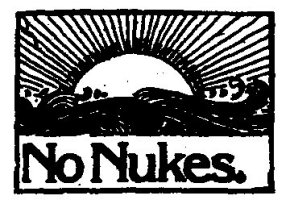


|
 |
| Nukes out of Africa |
Early in the morning of August 24, two days before the Earth Summit for Sustainable Development opened in Johannesburg, Greenpeace inflatable boats brought six activists to a jetty alongside the Koeberg nuclear power plant, Africa's sole nuclear power reactor. The activists quickly scaled a building next to the reactor domes and hung two banners which read "Nukes Out of Africa!"
Police arrested the activists on shore and then sent their own boats out to sea, arresting six more crew members on the Greenpeace boat. Twelve activists from nine countries were taken into custody, but their message that nuclear power and fossil fuels are unsustainable paths to economic development was clear in their wake.
 One consequence of nuclear power proliferation is the
developing global trade in plutonium from reprocessed reactor fuel.
In the weeks prior to the Koeberg occupation, Greenpeace ships
tracked the latest shipment of plutonium on the high seas: a load of
substandard MOX, or mixed oxide nuclear fuel refused by its Japanese
buyer and being returned to the Sellafield reprocessing plant in
England. Given the deadly nature of the cargo, Greenpeace committed
not to interfere with its passage, but as it passed near New Zealand
in July, two swimmers entered the sea to hold a banner bearing the
plea "Nuclear Free Pacific" as the Pacific Pintail and Pacific Teal
slowed and passed with their dangerous cargo.
One consequence of nuclear power proliferation is the
developing global trade in plutonium from reprocessed reactor fuel.
In the weeks prior to the Koeberg occupation, Greenpeace ships
tracked the latest shipment of plutonium on the high seas: a load of
substandard MOX, or mixed oxide nuclear fuel refused by its Japanese
buyer and being returned to the Sellafield reprocessing plant in
England. Given the deadly nature of the cargo, Greenpeace committed
not to interfere with its passage, but as it passed near New Zealand
in July, two swimmers entered the sea to hold a banner bearing the
plea "Nuclear Free Pacific" as the Pacific Pintail and Pacific Teal
slowed and passed with their dangerous cargo.
In Ireland, a flotilla is now preparing to meet the ships as they sail the Irish Sea to Sellafield. And back in Japan, a newly-revealed safety scandal has scuttled the entire MOX deal and may put Sellafield out of the reprocessing business. "We personally hurt the public's trust in us," declared the president of Tokyo Electric Power Company on August 30. "We cannot ask for understanding to continue the MOX fuel project."
For more information, visit www.greenpeace.org.
